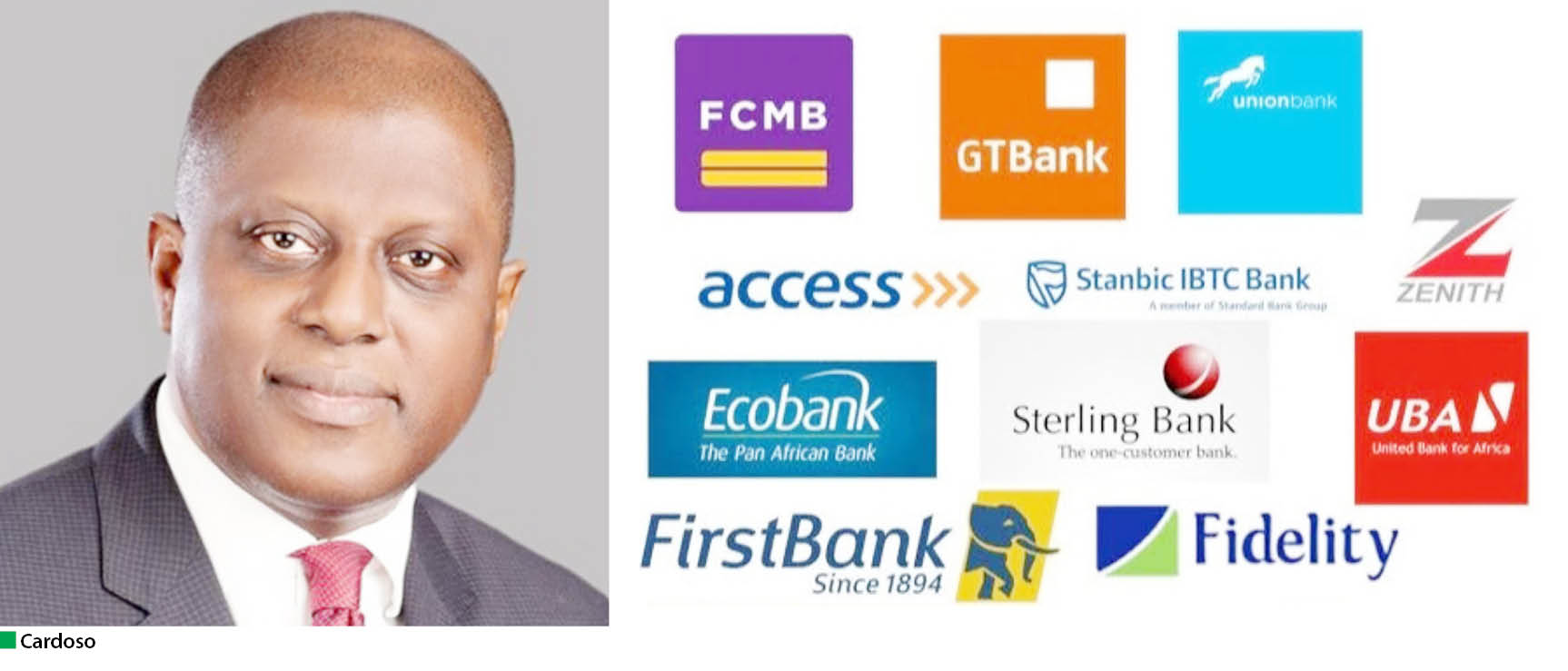The Central Bank of Nigeria (CBN), on Thursday announced new minimum capital requirements for banks, pegging the capital base for commercial banks with international authorisation at N500 billion.
In a circular issued by the Director of its Financial Policy and Regulation Department, Haruna Mustafa, to all commercial, merchant and non-interest banks and promoters of proposed banks, the apex ban stated that all banks were required to meet the minimum capital requirement within 24 months, commencing from April 1, 2024 and terminating on March 31, 2026.
In the newly unveiled threshold, the minimum capital base for commercial banks with national authorisation is now N200 billion, while those with regional authorisation is N50 billion.
Merchant banks would be expected to raise their capital to N50bn, while the new requirements for non-interest banks with national and regional authorisations are N20 billion and N10 billion respectively.
The CBN governor, Olayemi Cardoso had mooted plans for the new capital regime since November 2023, preparing the industry to service the $1trillion economy envisaged by the Bola Tinubu administration.
Cardoso, at the last Monetary Policy Committee (MPC) meeting, called on commercial banks to raise fresh capital to bolster their respective institutions’ capital base. The last time the CBN increased the capital base for banks was in 2005 when the current Anambra State governor, Charles Soludo, as the apex bank’s chief, raised it to N25 billion from N2 billion.
The jerking up of the banks’ minimum capital base to N25billion in 2005 led to a remarkable reduction in the number of banks from 89 to 24. While some of the banks merged, several others were completely taken over by stronger ones.
At N375bn, only 17 of 25 might meet capital requirement – Report
A recent report by Ernst and Young estimated that 17 out of the current 24 banks in the country might not meet the capital requirement from the CBN if the threshold is increased 15-fold to N375 billion from N25 billion. This report was published before last Thursday’s pronouncement by the CBN.
The report by Ernst and Young titled, “Navigating the Horizon: Charting the Course for Banks Amid Plans for Recapitalisation,” highlighted the impact of a possible increase in the minimum capital base for the banks, suggesting that the plan may force yet another round of mergers and acquisitions (M&As), just like it happened during the last recapitalisation exercise in 2004/2005.
According to the report, “In a worst-case scenario, that is, given a capital multiplier of 15, about 17 out of 24 banks would not meet the new minimum capital.
“The N25 billion capital base in 2005 was an equivalent of $188.2 million, but the figure has plunged significantly to about $18.4 million.”
Current equity base of commercial banks
Investigation by Daily Trust on Sunday revealed that Zenith Bank Plc, United Bank for Africa Plc, FBN Holdings Plc, Ecobank Transnational Incorporated (ETI), Guaranty Trust Holding Company Plc (GTCO) and Access Holdings Plc each has over N1 trillion in total equity as at September 30, 2023.
Zenith Bank closed September 30, 2023 with N1.9trn total equity from N1.31 trillion reported in 2022, while UBA declared N1.78trillion total equity as at September 30, 2023 from N922.1 billion reported in the 2022 full financial year.
As Access Holdings announced N1.64 trillion total equity as at September 30, 2023 from N1.23trn reported in 2022, FBN Holdings Plc declared N1.37 trillion total equity at nine months ended September 30, 2023 from N995.74 billion in 2022.
Similarly, GTCo Plc reported N1.27 trillion total equity in the period under review from N931.15 billion in 2022, while ETI posted N1.34 trillion total equity as at September 30, 2023 from N934.7 billion in 2022.
The only financial institution with a deficit in total equity is Unity Bank Plc. The retail bank reported N190.22 billion as at September 30, 2023 from N274.95 billion deficit in 2022.
Providus Bank Limited, a commercial bank founded in 2016, was reported to have taken bold steps to acquire majority stake in Unity Bank as part of the former’s business expansion plan. Unity Bank has been working hard to beef up its capital based since 2017.
As at September 30, 2023, Stanbic IBTC Holdings Plc, Fidelity Bank Plc, FCMB Group Plc, Sterling Financial Holdings Company Plc and Wema Bank Plc were listed below the N500 billion mark. Only Fidelity Bank and Wema Bank have pursued new capital raising from their shareholders.
Fidelity Bank had concluded plans to raise about N32 billion from its existing shareholders in the first tranche of a recapitalisation that may see the bank raising more than N160 billion in new equity funds.
Findings by Daily Trust on Sunday suggest that the management of GTCO is exploring a capital raise of up to N525 billion. According to a source, the bank is considering raising between N450 billion and N525 billion through a public offer. The proceeds from the offer would be used to bolster its share capital and provide the bank with greater working capital. It is expected that the bank would be adopting a “non-dilutive” approach in the capital raise, suggesting that the public offer might take the form of rights issue.
How Citibank, Standard Chartered stand
For Citibank and Standard Chartered, the recapitalisation drive means a potential requirement to substantially increase their share capital and premium, a report on Nairametrics revealed.
Citibank currently has a combined share capital and premium of just N14.4 billion, while Standard Chartered stands at N45.4 billion.
The challenge for these banks, according to the report on Nairametrics, is, either raise the required additional capital, estimated to be an additional N185 billion for Citibank and N154 billion for Standard Chartered, or consider other strategic options like mergers, acquisitions, or even forfeiting their licences, if they fail to meet the new requirements.
Despite Standard Chartered having exited most of its African operations, it has expressed commitment to maintaining its presence in Nigeria. The parent company of these banks are some of the largest financial institutions in the world and will face minimum challenges raising the capital should they decide to.
Analysts are of the view that their appetite for Nigeria would determine whether they would keep investing, considering the prevailing economic situation in the country.
Bankers oppose exclusion of retained earnings in CBN recapitalisation terms
Meanwhile, bankers are voicing opposition to the Central Bank’s decision to omit retained earnings from the share capital calculation in its recent recapitalisation guidelines. In defining share capital, the Central Bank excluded retained earnings from the calculation. Instead, it specified that share capital comprised only the banks’ ordinary share capital and premium.
The apex bank stated, “For existing banks, the capital requirements specified above shall be paid-in capital (paid-up plus share premium) only. Bonus issues, other reserves and additional Tier 1 (AT1 Capital shall not be allowed or recognised for the purpose of meeting the new minimum capital requirements.”
In accounting terms, retained earnings are considered a component of a company’s equity because they represent profits that have not been distributed as dividends but are instead reinvested in the bank.
Many bankers, who preferred anonymity, expressed the view that the CBN’s decision to exclude retained earnings from share capital calculations is flawed, stated a report on Nairametrics.
They argue that this approach fails to acknowledge the actual value these earnings represent, which goes against the conventional and legal treatment of a company’s capital structure.
Some bankers also expressed the opinion that while the CBN prefers banks to retain most of their earnings to reinforce their capital base, it should not concurrently prevent them from counting these undistributed earnings as part of their capital. According to estimates, the 10 largest banks in the country possess a cumulative total of N4.2 trillion in retained earnings.
With the exception of Sterling Bank, none would require additional capital raising if retained earnings were recognised as part of share capital, Nairametrics stated. This may explain the widespread dissatisfaction among bankers with the apex bank’s directive.
The CBN is prioritising direct capital injections into banks rather than relying on accounting entries to satisfy recapitalisation requirements.
Non-interest banks should be allowed 3 years – Prof Uwaleke
Reacting to the new banking sector recapitalisation policy, Nigeria’s first professor of capital market, Prof. Uche Uwaleke welcomed the development, noting that it would help to strengthen the country’s financial system, adding that it is also a potential boost to the stock market.
He said, “In view of naira devaluation, following the unification of exchange rates, the new calibrated minimum capital requirements seem okay, unlike the uniform capital base of N25 billion stipulated in 2005.”
Speaking on the approach that would be adopted by the banks, Uwaleke said the stock market (Option 1) presents the most feasible option as few will likely go the M&As route.
He also said the two years’ period allowed is sufficient to implement recapitalisation.
Uwaleke, who is also the President of the Capital Market Academics of Nigeria, stressed that since the new capital base requirement is based on the type of authorisation (International, National or Regional), the
CBN may consider applying a differentiated Cash Reserve Ratio (CRR) according to the category of licence, instead of a uniform rate (currently 45%) for commercial banks.
He also said: “In view of the young age of the Non-Interest Banks in Nigeria, they should be allowed a longer period, say, three years to meet the minimum capital requirements.”
Banks currently carry operating capital that is sufficient to meet their business needs
Also, reacting to the development, Group Chief Executive Officer, Cowry Asset Management, Johnson Chukwu said: “I’m one of those apostles that urge that they need to think deeper when it comes to capitalisation of the banks, because the banks currently carry operating capital that is sufficient to meet their business needs”.
He said the banks would carry capital they need for operating business which means that there must be businesses they need to lend to, or liabilities in the economy that the capital they are carrying will help them generate.
“And I say that with a high sense of responsibility, to the extent that, if you want the banks to carry a capital requirement required for a $1 trillion economy, the Nigerian economy is not going to get $1 trillion in the next 20 years or 30 years at the current growth rate.
“My take is that even with the government projection based on the medium-term expenditure framework that the economy will grow at 3.7 per cent in 2024 and 4.22 per cent 2025 and 4.7 per cent in 2026, and if you use that trajectory, there is no way that growth rates will lead you to an economy of $1 trillion in 2030.
“So, you’re going to have the banks carrying capital that is beyond their operating need. This means you are going to get to a point where the return on capital employed by the banks will be inconsequential and will decline so much that investors will no longer be interested in buying banking stocks.
“That is why I said in a previous interview that the Central Bank has to be more circumspect when it wants to make that decision, because it could have a negative impact on the banking industry, where investors would lose interest in investing in bank shares. This is because, the banks’ shares are generating returns far below the commensurate return they will get from any other asset class”, he stressed.
Chukwu argued that if the country is growing at 5 per cent, by 2030, we will just be about $550 billion. “So, for you to grow to become a $1 trillion economy, you need to grow at more than 20 per cent. And no economy has recorded 20 per cent year-on-year growth for five to six years. But even at 20 per cent, you will still not achieve $1 trillion by 2030.”
Whether the CBN’s new directive to the banks will help the current administration to realise its objective of a trillion dollar economy, therefore, remains to be seen.

 Join Daily Trust WhatsApp Community For Quick Access To News and Happenings Around You.
Join Daily Trust WhatsApp Community For Quick Access To News and Happenings Around You.


